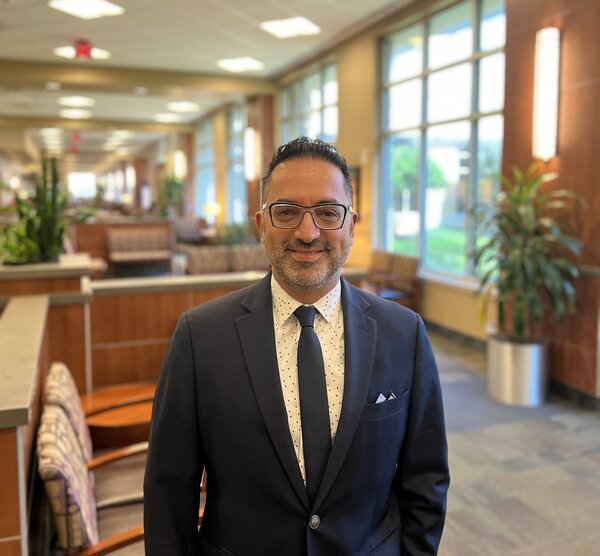COPH graduate certificate opens doors to career in infection control
Barmak Kusha said he experienced a change of heart while in medical school. While he liked the “fighting disease part” of the field, he wasn’t sure that treating ill people was what he really wanted to do for a career.
After leaving medical school, he immediately began taking courses in epidemiology and biostatistics as a graduate student at the University of Wisconsin-Madison and decided to apply to a public health program while working in his first gig in public health at the Wisconsin Department of Public Health.
His new path led him to earn his MPH from Yale University in epidemiology of microbial diseases.
From there, he would go on to work in international public health for 15 years on issues including malaria, AIDS, tuberculosis, disaster relief, vaccine program implementation and maternal and child health, to name a few. Most of his work was at private not-for-profits, such as International Medical Corps, RTI, Plan International and JSI, but he also spent two years as an Emerging Leaders Fellow at the U.S. Department of Health and Human Services, including at the NIAID/NIH and the Office of Global Health of the Secretary of HHS.
“The ability to make a difference in the lives of people en masse—hundreds, thousands and millions of people—that’s something really very powerful,” Kusha said of what he enjoyed about working in the field of public health.

But, despite all that, he said that something was still missing for him.
“It became clear that a career track was very difficult in this field,” he said. “Because of the nature of the beast, most international public health/global health work is grant driven or contractor based. I was getting more sidetracked into management types of activities and doing less of what I wanted to do, which was the scientific and technical aspect of the work.”
After consulting with a former professor, Dr. Peter Hotez, dean of the National School of Tropical Public Health at Baylor University, professor of pediatrics and molecular virology & microbiology, and co-director of Texas Children’s Hospital Center for Vaccine Development, he started to consider working in hospital infection prevention and control.
With family in Florida and a new desire to move and change locations away from the competition-saturated Washington, D.C., area, he started to pursue USF College Public Health’s graduate certificate in infection prevention, which he earned in 2019.
“This program is extremely aligned with the knowledge competencies of the Certification Board of Infection Control. So, it doesn’t waste your time,” he said. “Every single objective of every single session of every single of those four classes is aligned with the knowledge competencies of the Certification in Infection Control (CIC). From the very beginning it pushes you toward your CIC and it is a very professionally driven curriculum that leads you somewhere.”
He said this graduate certificate program is “ideal for the adult learner who is looking for a career shift” and because of this program, he said, he was able to start his new path in infection prevention within a short period of time.
Kusha is now director of infection prevention at HCA Florida Trinity Hospital, a 350-bed acute care hospital in west Pasco County, with a catchment area that includes Pinellas and Hillsborough counties.
He’s directly responsible for all infection prevention activities of the hospital that are required through hospital policy and regulation, or which are evidenced-based best practices.
“That runs the gamut from essentially preventing hospital acquired infections to preventing the spread of infections patients bring in. We want to make sure that infection doesn’t spread to visitors, staff and other patients. It also includes things that we do to patients here, whether it’s through invasive devices such as central venous lines, indwelling urinary catheters and ventilators and surgical procedures. But it also includes water safety, air quality, construction, protection of dialysis patients, pharmacy, food service, employee health and so on. It touches on every element of a hospital’s operation as it pertains to preventing infection of a patient,” he said.

He said this career shift from international public health to hospital infection prevention has been one of his proudest professional achievements.
“In a very short period, I gained the experience and accomplishments necessary to be promoted to becoming director of infection prevention,” Kusha said.
His future plans include applying to the USF COPH’s DrPH program.
“My public health practice is what I do every day, which is to help the hospital provide health care safe from infection,” he said. “My passion is to be able to be a source of information, resources, tools and expertise to help everyone else drive the practice in infection prevention. Infection prevention ultimately relies on all the primary bedside caregivers, nurses, doctors and ancillary departments such as EVS, food and nutrition and pharmacy. It’s knowing that you’re in a position where you can drive something on a mass community level, that’s my passion.”
Alumni Fast Five:
What did you dream of becoming when you were young?
A wildlife biologist.
Where would we find you on the weekend?
Outside reading and sipping coffee.
What is the last book you read or what are you currently reading?
“Memory of Water,” by Emmi Itäranta.
What superpower would you like to have?
I don’t want any superpower, that is dangerous! I don’t trust myself!
What is your all-time favorite movie?
Denis Villeneuve’s version of “Dune” that came out in 2021.
Story by Anna Mayor, USF College of Public Health
